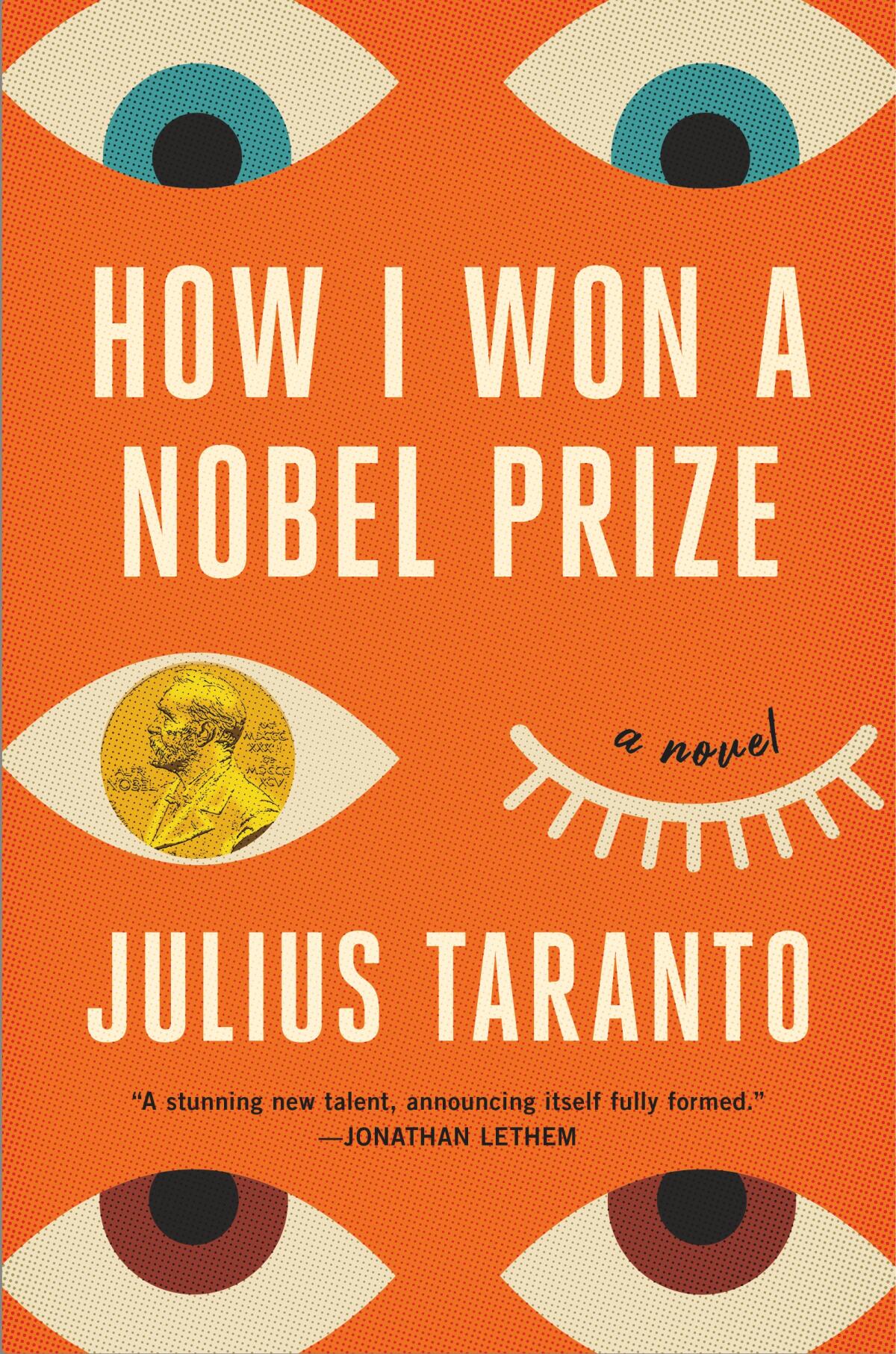What would a university of the canceled look like? Read this novel

- Share via
Review
Review
By Julius Taranto
Little, Brown: 304 pages, $27
If you buy books linked on our site, The Times may earn a commission from Bookshop.org, whose fees support independent bookstores.
The Rubin Institute, the purported citadel of learning at the center of Julius Taranto’s very funny debut novel, “How I Won a Nobel Prize,” is literally built on resentment. Founded by a libertarian billionaire named B.W. Rubin, the institute is located on an island off the coast of Connecticut, its main building exactly tall enough for someone to ascend to its 42nd-story penthouse and look down on Yale. There’s a dedicated telescope, just for that.
The Rubin is designed to be a haven for artists, thinkers and other notables who’ve been #MeToo-ed or otherwise stripped of status by the Ivies, liberal media and other elites. (“Give me your cancellees and deplorables, your preeminent deviants, we’ll take them!”) Helen, the brilliant quantum physicist who narrates the book, isn’t a cancellee herself, but she’s following her Nobel-laureate advisor, who’s fled vague accusations of sexual impropriety at Cornell.
Fiction from Zadie Smith, Yiyun Li and Jesmyn Ward, memoirs from Sly Stone and Werner Herzog and a bio of Elon Musk are among the fall’s most anticipated books.
Considering herself more or less above the Rubin’s politics, or anybody’s — she’s studying superconductive materials that might fix climate change, leave her be! — Helen spends the early pages of the book bemusedly cataloging the place’s idiosyncrasies. The main building is a flagrantly phallic tower known as the Endowment. The campus ice-cream shop bears the Trumper-friendly name Two Scoop Creamery. Campus gatherings are catered with “ostentatiously problematic meat.”

But Taranto wants to complicate the Rubin, not just mock it. Helen’s husband, Hew, takes part in protests against the institute, only barely avoiding serious injury when a Proud Boys-ish group attacks them. She befriends Leopold Lens, a literary provocateur, plainly inspired by Philip Roth, who soberly endorses the Rubin’s laissez-faire ethics. Affairs are pondered. Her research begins going sideways and so does her relationship with Hew, as they begin squabbling over the bad-person-great-artist dilemmas that have launched a thousand thinkpieces. “Are all good things done only by irreproachably good people?” she fumes. The mood quickly becomes less ha-ha funny and more uh-oh funny.
The original title for “How I Won a Nobel Prize” revealed the novel’s conflict more overtly: “The Moral Offset.” It’s easy to see why that title got scratched — it doesn’t convey the wry, satirical tone Taranto is aiming for. But it does nail the kind of anxiety that drives so many culture-war conversations. Perhaps we can devise a calculus that will resolve these unresolvable conflicts: X ethical misstep times Y amount of time divided by Z sincere apology/prison time/exile equals an acceptable amount of atonement.
Helen undertakes this kind of number-running as her relationship frays, attempting a cost-benefit analysis of remaining with Hew. It’s funny because she’s so diligent about it, and not-funny because it’s what everybody’s trying to do. Quantum physics “was a fairly simple phenomenon relative to what I was now attempting to simulate,” she reports, exasperated.
Claire Dederer, author of ‘Monsters: A Fan’s Dilemma,’ explains why she went beyond bad men to probe our history with all artists who defy moral expectations
As protests intensify, Helen’s narration becomes more manic, acquiring more double exclamation points and question marks. And as the Rubin doubles down — proudly admitting a couple of self-proclaimed Nazis as students — it becomes plain that while Taranto is skeptical of cancel-culture calculus, he doesn’t consider anti-wokeism a meaningful counterweight. The motivation of Rubin leadership isn’t intellectual searching but profit and trolling, mocking not just perceived elites but any morality that doesn’t shore up patriarchal power. Helen can’t pretend she can absent herself from the consequences; the Rubin can’t pretend its avoidance of morals is a moral act.
Hang on, are we still laughing? Taranto has to perform some rhetorical jiujitsu to preserve the humor of the premise. The sexual assault of a Rubin student is effectively pushed off-screen. After the opening pages, Taranto avoids mentioning the nickname protesters volubly assigned to the Rubin: Rape Island. Excepting some antisemitic rhetoric directed toward B.W. Rubin himself, ethnic and racial strife is ignored or soft-pedaled. “Nobel Prize” is a kind of experimental lab of satirical fiction: How many through lines of today’s culture wars can you realistically stuff into a novel while still claiming to have produced a comedy?
A fair number, but the trade-off (or, uhm, offset) Taranto has to make to get there involves abandoning some of the realism he so meticulously arranged in the opening chapters. The novel’s climax is nearly as cartoonish as the mudslinging in your weird uncle’s Facebook feed.
‘The Fraud,’ Zadie Smith’s sixth novel, cleverly follows the famous 19th century trial of a fraudulent claimant who becomes a populist hero. Sound familiar?
And yet, there’s something to be said for a novel that validates the messiness of the battles and doesn’t try so strenuously to resolve them. Which, to render a moral judgment, ought to be the mission of the novel in the first place. In her essay collection “Feel Free,” Zadie Smith made this point while writing about the actual Philip Roth: “Fiction messes with our sense of what it is possible to do with our judgments. It usefully suspends our great and violent desire to be in the right on every question, and creates an unholy and ungovernable mix of the true and the false.”
To that point, Taranto pulls a useful metaphor out of Helen’s status as a quantum physicist. References to Schrodinger’s cat, the thought experiment about the unseen feline in the box, abound: In a messy relationship with Hew, Helen is in “Shrodinger’s wedlock.” Sexless flirting is “Schrodinger’s affair.” Her own non-ideological ideology was “Schrodinger’s politics.” Uncertainty is the defining state of affairs at the subatomic level. That’s true at human scale too.
Athitakis is a writer in Phoenix and author of “The New Midwest.”
More to Read
Sign up for our Book Club newsletter
Get the latest news, events and more from the Los Angeles Times Book Club, and help us get L.A. reading and talking.
You may occasionally receive promotional content from the Los Angeles Times.










